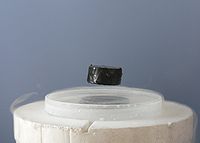
Photo from wikipedia
Abstract The influence of an electric field on the phase transition parameters and the electrocaloric response in ferrielectric (NH4)2SO4 was studied using a universal multifunctional adiabatic calorimeter. The very low… Click to show full abstract
Abstract The influence of an electric field on the phase transition parameters and the electrocaloric response in ferrielectric (NH4)2SO4 was studied using a universal multifunctional adiabatic calorimeter. The very low sensitivity of the phase transition temperature to the electric field, dT0/dE ≈ 5·10-3 K/(kV/cm), was shown to be the reason for the low maximum value of the intensive electrocaloric effect, ΔTAD, at E = 11 kV/cm: direct and indirect measurements gave the values of 0.01 K and 0.05 K, respectively. However, the extensive electrocaloric response revealed by an analysis of the entropy–temperature–electric field phase diagram was relatively large, with a value of ΔSECE ≈ − 19 J/kg K, due to the significant contribution of a jump in the excess entropy to the total value, δS0/ΔS0 ~ 0.37. An additional irreversible increase in temperature under the electric field was associated with the Joule effect and indicated a significant electrical conductivity of ammonium sulphate.
Journal Title: Journal of Alloys and Compounds
Year Published: 2022
Link to full text (if available)
Share on Social Media: Sign Up to like & get
recommendations!